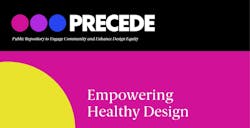Perkins&Will Launches Open-Source Tool for Healthier Environments
Perkins&Will has introduced PRECEDE, a digital tool providing architects and designers with centralized access to crucial public health data. The “Public Repository to Engage Community and Enhance Design Equity,” or PRECEDE, is a geospatial database that integrates demographic, environmental and health data from the U.S., empowering designers to make informed decisions for a healthier built environment and promoting design equity.
The tool displays public health data in percentile form, offering designers a quick overview of pertinent demographic factors, exposures and outcomes for their projects. It allows insights into details like median income, traffic proximity or cancer prevalence at various geographical levels. PRECEDE not only supplies educational resources but also recommends actionable solutions to address these factors.
“Each community has a unique health context and requires a tailored health response,” said Dr. Erika Eitland, a public health scientist and co-director of the Perkins&Will Human Experience (Hx) Lab. “PRECEDE was built to advance restorative environmental justice by embedding public health priorities early into the design process. If every designer is a public health professional, then PRECEDE is an essential tool to advance the success of their design and support occupant health.”
PRECEDE is funded by a Transform Grant from the American Society of Interiors Designers (ASID) Foundation and matched by Perkins&Will. It underwent two years of testing and development before its recent launch. The initiative was spearheaded by Eitland, alongside a team of design practitioners and researchers, including interns from Harvard University’s T.H. Chan School of Public Health and Graduate School of Design, and Columbia University’s Mailman School of Public Health.
The Need
For decades, health disparities in the U.S. have been widening. The COVID-19 pandemic has accentuated these inequities, revealing the close correlation between environmental factors, preexisting health conditions, and quality of life. Designers, architects and urban planners play a pivotal role in shaping the spaces where people spend 90% of their time, directly influencing well-being.
PRECEDE allows designers to easily identify the public health factors most relevant to a given community by synthesizing data from the U.S. Census Bureau, Environmental Protection Agency (EPA), Centers for Disease Control and Prevention (CDC), U.S. Department of Agriculture (USDA), U.S. Geological Survey (USGS) and City Health Dashboard. Ultimately, PRECEDE shortens the time it takes to uncover key metrics—including socioeconomic factors, environmental quality and health outcomes—that inform an effective design response.
The Breakdown
PRECEDE's "Learn," "Explore," and "Act" sections aim to enlighten designers on the health implications of various indicators (e.g., asthma or obesity), visually represent health data across geographic areas, and suggest potential design strategies. Engaging comics in the "Learn" section adds a fun element to education, while the "Explore" feature enables designers to input their project site on a map to identify key indicators affecting the local population.
After identifying and comprehending key indicators, the research team aimed to empower designers to take action. The "Act" dashboard comprises an expanding database of evidence-based design suggestions, sortable by health indicators and project scale—interiors, architecture, or urban design. For instance, if a designer is assessing a flood-exposed building, PRECEDE suggests strategies like drinking water filtration, emergency preparedness, and green roofs. An interior design query related to noise pollution generates recommendations for exterior acoustic comfort, noise stress reduction and sound-absorbing surfaces.
In Practice
Perkins&Will has used the tool for several projects. The firm was awarded a 6-12 school at Durham School of the Arts after sharing initial PRECEDE findings on racial/ethnic segregation, children in poverty, and income inequality. PRECEDE was also used on a workplace interior design project with Greenpeace in Washington, D.C., and an affordable housing development in Chicago, Thrive Englewood. For each project, the design teams were able to identify potential social and health-related vulnerabilities that created challenges for occupants and tailor design strategies to address them. Additional case studies will soon be available on the PRECEDE site.
“An outcome of using PRECEDE is the opportunity to engage project stakeholders during the early discovery phase,” said David Cordell, an interior designer at Perkins&Will and member of the PRECEDE development team. “Designers can present data gathered by PRECEDE and use that data as a conversation starter and education tool to find out what is important to the community that will be impacted by the design. We’ve seen the success of this already in a few of our projects from interior design to urban planning.”
What’s Next?
Perkins&Will is currently pursuing partnerships with individuals and organizations to expand the depth, rigor, and accessibility of PRECEDE, beyond the interior scale which was the focus of the ASID Transform Grant. People can suggest design recommendations through a “Contribute” feature in the “Act” section; the research team will review all contributions before publishing them to the site. To contact the Perkins&Will Hx Lab directly, visit their website (linked above) and submit inquiries on the Contact Us page.
With support and future funding, PRECEDE will eventually incorporate more design strategies, focusing on mental health and disability inclusion.
